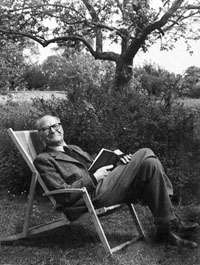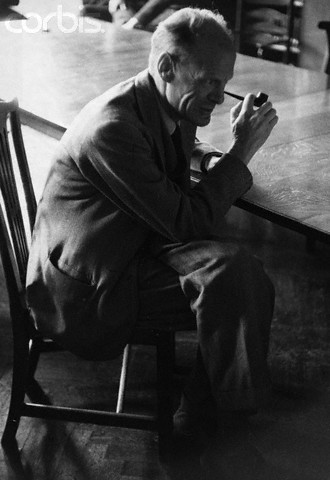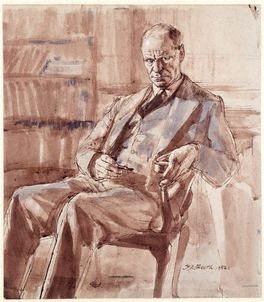<Back to Index>
- Philosopher Gilbert Ryle, 1900
- Painter Gustave Caillebotte, 1848
- Duke of Württemberg Friedrich I, 1557
PAGE SPONSOR



Gilbert Ryle (19 August 1900, Brighton – 6 October 1976, Oxford), was a British philosopher, and a representative of the generation of British ordinary language philosophers that shared Wittgenstein's approach to philosophical problems, and is principally known for his critique of Cartesian dualism, for which he coined the phrase "the ghost in the machine". Some of his ideas in the philosophy of mind have been referred to as "behaviourist." Ryle's best known book is The Concept of Mind (1949), in which he writes that the "general trend of this book will undoubtedly, and harmlessly, be stigmatised as 'behaviourist'." Ryle, having engaged in detailed study of the key works of Bernard Bolzano, Franz Brentano, Alexius Meinong, Husserl, and Heidegger, himself suggested instead that the book "could be described as a sustained essay in phenomenology, if you are at home with that label."
Ryle was born in Brighton, England, in 1900 and grew up in an environment of learning. His father was a Brighton doctor, a generalist who had interests in philosophy and astronomy, and passed on to his children an impressive library. Ryle was initially educated at Brighton College. In 1919, he went to Queen's College at Oxford, initially to study Classics but was quickly drawn to Philosophy. He would graduate with first class honours in 1924 and was appointed to a lectureship in Philosophy at Christ Church, Oxford. A year later, he was to become a tutor. Ryle remained at Christ Church until World War II.
A capable linguist, he was recruited to intelligence work during World War II, after which he returned to Oxford and was elected Waynflete Professor of Metaphysical Philosophy and Fellow of Magdalen College, Oxford. He published his principal work, "The Concept of Mind" in 1949. He was president of the Aristotelian Society from 1945 to 1946, and editor of the philosophical journal Mind from 1947 to 1971. Ryle died on 6 October 1976 at Whitby, North Yorkshire.
His brothers John Alfred (1889 – 1950) and George Bodley (1902 – 1978), both educated at Brighton College as well, also had eminent careers. John became Regius Professor of Physic at the University of Cambridge 1935 - 45
and physician to King George V. After serving as Director of Forestry
first for Wales and then England, George was Deputy - Director of the Forestry Commission 1963 - 65 and awarded the CBE. His grandfather was John Charles Ryle, the first Anglican Bishop of Liverpool and 19th century evangelical leader. Ryle
believed it was no longer possible for a philosopher to believe that it
was the task of a philosopher to study mental as opposed to physical
objects. However, in its place, Ryle saw the tendency of philosophers
to search for objects whose nature was neither physical nor mental.
Ryle believed, instead, that “[p]hilosophical problems are problems of
a certain sort; they are not problems of an ordinary sort about special
entities.” Ryle offers the analogy of philosophy as being like cartography.
Competent speakers of a language, Ryle believes, are to a philosopher
what ordinary villagers are to a mapmaker. The ordinary villager has a
competent grasp of his village, and is familiar with its inhabitants and geography.
However, when asked to interpret a map for the same knowledge he has
practically, the villager will have difficulty until he is able to
translate his practical knowledge into universal cartographal terms.
The villager thinks of the village in personal and practical terms
while the mapmaker thinks of the village in neutral, public,
cartographical terms. By
"mapping" the words and phrases of a particular statement, philosophers
are able to generate what Ryle calls "implication threads." In other
words, each word or phrase of a statement contributes to the statement
in that, if the words or phrases were changed, the statement would have
a different implication. The philosopher must show the directions and
limits of different implication threads that a "concept contributes to
the statements in which it occurs." To show this, he must be "tugging"
at neighbouring threads, which, in turn, must also be "tugging."
Philosophy, then, searches for the meaning of these implication threads in the statements in which they are used. In The Concept of Mind (1949), Ryle admits to having been taken in by the body - mind dualism which permeates Western philosophy, and claims that the idea of Mind as an independent entity, inhabiting and governing the body,
should be rejected as a redundant piece of literalism carried over from
the era before the biological sciences became established. The proper
function of Mind - body language, he suggests, is to describe how
higher
organisms such as humans demonstrate resourcefulness, strategy, the
ability to abstract and hypothesize and so on from the evidences of
their behaviour. He attacks the idea of 17th and 18th century thinkers (such as Descartes) that nature is a complex machine, and that human nature is a smaller machine with a "ghost" in it to account for intelligence,
spontaneity and other such human qualities. While mental vocabulary
plays an important role in describing and explaining human behavior,
neither are humans analogous to machines nor do philosophers need a
"hidden" principle to explain their super - mechanical capacities. Ryle
asserted that the workings of the mind are not distinct from the
actions of the body. They are one and the same. Mental vocabulary is,
he insists, merely a different manner of describing action. He also claimed that the nature of a person's motives is defined by that person's dispositions to act in certain situations. There are no overt feelings, pains,
or twinges of vanity. There is instead a set of actions and feelings
that are subsumed under a general behavior - trend or propensity to act,
which we term "vanity." Novelists,
historians and journalists, Ryle points out, have no trouble in
ascribing motives, moral values and individuality to people's actions.
It is only when philosophers try to attribute these qualities to a
separate realm of mind or soul that the problem arises. Ryle also
created the classic argument against cognitivist theories of explanation, Ryle's Regress. The famous American classicist and philosopher Allan Bloom was harshly critical of Ryle's understanding of Platonic texts,
writing: "In themselves Ryle's opinions are beneath consideration, but
they do deserve diagnosis as a symptom of a sickness which is
corrupting our understanding of old writers and depriving a generation
of their liberating influence... Such scholarship should give us pause,
for Ryle is held by many to be one of the preeminent professors of
philosophy in the Anglo - Saxon world." Bloom's
central criticism indicts Ryle for anachronistically
"Aristotelianizing" Platonic texts, thereby putting them through an
artificial "analytic strainer." According to Bloom, this mediation
vitiates the content of Plato's text by "torturing Plato to conform to
a dogmatic starting point," rather than entering at the natural
beginning. Bloom concludes, The Concept of Mind is
Ryle's principal philosophical contribution. The sharpness of its
challenge to Cartesian dualism - the idea that mind and body are
radically distinct substances, an idea guyed under the phrase 'the
ghost in the machine' - was more influential than the
quasi - behaviourism with which he sought to replace it. The vivid
metaphors that were (to some) an enjoyable feature of Ryle's prose in The Concept of Mind came unhelpfully to dominate his writing. In Dilemmas,
for example, there is seriously more metaphor than argument. It should
be stressed, too, that Ryle's 'Descartes' is not the Descartes of
Cartesian scholarship but a caricatural Descartes. A distinction deployed in The Concept of Mind,
between knowing-how and knowing-that (e.g., knowing how to tie a reef
knot and knowing that Queen Victoria died in 1901), has attracted
independent interest. Ryle
took a narrow view of the scope of philosophy. Philosophy, for Ryle,
did not extend beyond the philosophy of mind, philosophical logic, and
the philosophy of language. Ethics, political philosophy, and
aesthetics were 'philosophy' only by a strained courtesy and a
burdensome historical tradition. Ryle's notion of thick description, from "The Thinking of Thoughts: What is 'Le Penseur' Doing?" and "Thinking and Reflecting", has been an important influence on cultural anthropologists like Clifford Geertz. The Concept of Mind was recognized on its appearance as an important contribution to philosophical psychology, and an important work in the ordinary language philosophy movement. However, in the 1960s and 1970s the rising influence of the cognitivist theories of Noam Chomsky, Herbert Simon, Jerry Fodor and others in the neo - Cartesian school became predominant. Chomsky even wrote a book entitled Cartesian Linguistics. In philosophy the two major post-war schools in the philosophy of mind, the representationalism of Jerry Fodor and the functionalism of Wilfrid Sellars posited
precisely the 'internal' cognitive states that Ryle had argued against.
However as influential modern philosopher and former student Daniel Dennett has pointed out, recent trends in psychology such as embodied cognition, discursive psychology, situated cognition and others in the post-cognitivist tradition have provoked a renewed interest in Ryle's work. Dennett has provided a sympathetic foreword to the 2000 edition of The Concept of Mind. Ryle
remains a significant defender of the possibility of lucid and
meaningful interpretation of higher-level human activities without
recourse to an abstracted soul.
“ The
philosophical arguments which constitute this book are intended not to
increase what we know about minds but to rectify the logical geography
of the knowledge we already possess. ”
“ The
usual criticism of men of Ryle's persuasion is that they are dry and
unable to deal with important problems. Although this is largely an
accurate description, the decisive objection to them is that they lack
that very precision on which they pride themselves... Although Ryle
professes great interest in Plato's understanding of the soul, he pays
no attention to eros, which is undeniably for Plato one of the most
important constituents of the soul. But, for Ryle, eros is another one
of those sub - philosophic things like politics which mature professors
at Oxford learn to get over. ”